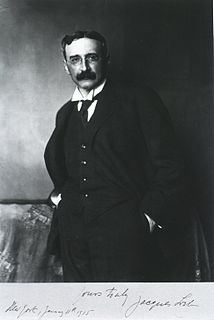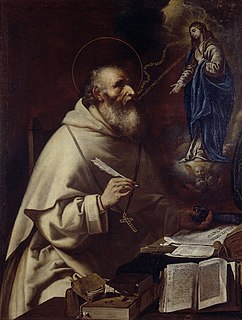A Quote by Paulo Coelho
Each stone, each bend cries welcome to him. He identifies with the mountains and the streams, he sees something of his own soul in the plants and the animals and the birds of the field.
Related Quotes
Man is a megalomaniac among animals-if he sees mountains he will try to imitate them by pyramids, and if he sees some grand process like evolution, and thinks it would be at all possible for him to be in on that game, he would irreverently have to have his whack at that too. That daring megalomania of his-has it not brought him to his present place?
To say that there is a soul in stones simply in order to account for their production is unsatisfactory: for their production is not like the reproduction of living plants, and of animals which have senses. For all these we see reproducing their own species from their own seeds; and a stone does not do this at all. We never see stones reproduced from stones; ... because a stone seems to have no reproductive power at all.
...and suddenly it occurred to him that the birds, whose twitters and repeated songs sounded so pretty and affirming of nature and the coming day, might actually, in a code known only to other birds, be the birds each saying 'Get away' or 'This branch is mine!' or 'This tree is mine! I'll kill you! Kill, kill!' Or any other manner of dark, brutal, or self-protective stuff—they might be listening to war cries. The thought came from nowhere and made his spirits dip for some reason.
Rather let us imagine the anima mundi as that particular soul-spark, that seminal image, which offers itself through each thing in its visible form. Then anima mundi indicates the animated possibilities presented by each new event as it is, its sensuous presentation as a face bespeaking its interior image - in short, its availability to imagination, its presence as psychic reality. Not only animals and plants ensouled as in the Romantic vision, but soul is given with each thing, God-given things of nature and man-made things of the street.
The King beneath the mountains, The King of carven stone, The lord of silver fountains Shall come into his own! His crown shall be upholden, His harp shall be restrung, His halls shall echo golden To songs of yore re-sung. The woods shall wave on mountains. And grass beneath the sun; His wealth shall flow in fountains And the rivers golden run. The streams shall run in gladness, The lakes shall shine and burn, And sorrow fail and sadness At the Mountain-king’s return!
There may be different channels of approach, yes. For not all peoples walked in the field when the wheat was ripe. Neither did all stand at the tomb when Lazarus was called forth. Neither were they all present when He walked on the water, nor when He fed the five thousand, nor when He hung on the Cross. Yet each experience answered, and does answer to something within each individual soul-entity. For each soul is a corpuscle in the body of God.
The world of organisms, of animals and plants, is built up of individuals. I like to think, then, of natural history as the study of life at the level of the individual-of what plants and animals do, how they react to each other and their environment, how they are organized into larger groupings like populations and communities.
Out of the silver heat mirage he ran. The sky burned, and under him the paving was a black mirror reflecting sun-fire. Sweat sprayed his skin with each foot strike so that he ran in a hot mist of his own creation. With each slap on the softened asphalt, his soles absorbed heat that rose through his arches and ankles and the stems of his shins. It was a carnival of pain, but he loved each stride because running distilled him to his essence and the heat hastened this distillation.
When the father dies, he writes, the son becomes his own father and his own son. He looks at is son and sees himself in the face of the boy. He imagines what the boy sees when he looks at him and finds himself becoming his own father. Inexplicably, he is moved by this. It is not just the sight of the boy that moves him, not even the thought of standing inside his father, but what he sees in the boy of his own vanished past. It is a nostalgia for his own life that he feels, perhaps, a memory of his own boyhood as a son to his father.






































